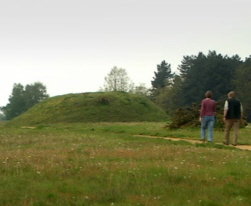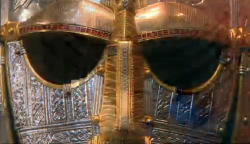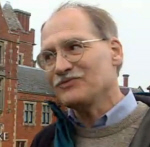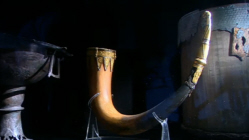Anglo-Saxon Myth
Dr Helen Geake, Heinrich Harke
Britain AD: King Arthur’s Britain

Sutton Hoo Mound
As an island people, we Brits have been obsessed with the idea of invasion. And the story of the arrival of the Anglo-Saxons has long been accepted
as a part of our history.
I’m going to show that the myth of the Anglo-Saxon invasion is just a tale.
Leading-edge archaeology is beginning to re-examine the dramatic changes
that took place in this country in the centuries after the Roman troops departed, and a very different story to the one which we have become accustomed
is emerging.
Just before World War II archaeologists from Suffolk uncovered one of the greatest discoveries of our time – the Anglo-Saxon burial mounds at Sutton Hoo.
Helen Geake explains.
Helen Geake “Mrs Pretty decided to investigate the burial mounds on her property. She rang up Ipswich Museum asking for advice on a freelance
archaeologist. It’s like another world, where a landowner can employ an archaeologist to open their burial mounds, but that’s what happened. In mound
one he discovered an intact ship and a burial chamber.”

Dr Helen Geake

Gold Helmet
When news got out, archaeologists from Cambridge University and the British Museum came in to help and the most fabulous, extraordinary
treasure was discovered there.
Excavations revealed the burial chamber of a person in a wooden ship. He was accompanied by a wealth of fabulous objects. This was the grave of
a very rich man.
Dr Helen Geake “Helmets so incredibly rare. Special headgear appropriate for a king, as it still is today. He’s got other things like the
strange whetstone that’s made into a sceptre. It’s got polish in the middle where your hand could have held it and a cup for the knee so you could
hold the sceptre like a modern king. Some people see a very strong Swedish influence, some see a strong classical Byzantine influence.
Other people say he’s got a bit of everything, is trying out a lot of different methods to C that he is an important ruler of the East Angles.”
By the seventh century, parts of Britain had become a series of politically powerful kingdoms, later to be known as England.

Classical Byzantine Influence
Do you suppose a boatload of Anglo-Saxon royal family came sailing up and thought ‘This is a place for me’ got off the boat and set up their
kingdom here?
Helen Geake “The origin myths we have, recorded by people like Bede, do seem to indicate that in the fifth century boatloads of royalty did row
up and create their kingdoms. But they don’t have any archaeological evidence to back that up. What seems much more likely is that by some process
of internal social development, things arose at some point in the late sixth century, and then decided to create this origin myths to explain
where they’d come from. Probably they just murdered and fought their way to the top, they wanted to say they’d always been royal, in fact,
descended from gods”
Sutton Hoo is the most elaborate of a number of rich Anglo-Saxon burials over the south and east of Britain. Archaeologists are divided about where
these new leaders came from. Heinrich Harke favours the idea they were invaders.

Heinrich Hark
Heinrich Harke “Until Sutton who was found, Taplow was the richest Anglo-Saxon grave in England. These big Anglo-Saxon burials of the seventh
century were often located on the tops of ridges. Taking up a dominant position in the landscape shows who you and your family was.”
Heinrich Harke believes an invasion is the best way of explaining the changes in culture that took place after the Romans left. Why do we have
to have migrations? It’s very difficult to prove that people came here in large numbers from abroad.

Taplow Treasure
Heinrich Harke “Francis, I believe you can demonstrate that this is still, given the evidence, the best possible explanation. Your argument is we
do not need migrations to explain cultural change, this is the underlying argument. I agree with that. If you look at post-Soviet Russia, you see a
huge culture change but it is not brought in by immigrant Westerners, it is marketed there. Of course, you can see, there is no proof they came
here, they cannot trace them across the North Sea, but it is still the best explanation.”
Heinrich I’d love to agree with you, only I can’t see any outsiders coming here without there being a fight, and there is no evidence for a
struggle. If people move onto my land, I’m not happy about that.
Heinrich Harke “If you’re there, you are not.”
Right. So you think that people will have moved out? There’s not much evidence for that.
Heinrich Harke “After the collapse of a civilisation you do have population decline. If there is population decline, there was also space.
More space than there was in the Roman system.”
I don’t believe there was a hole in British society. If anything… You know, the taxes were removed, I’d have thought people said “Whoopee! I
don’t have to pay taxes, I’m better off”. So when the Romans left, people probably got more prosperous.
Heinrich Harke “Very much a farmer’s view, I’d have thought. I like that.”





